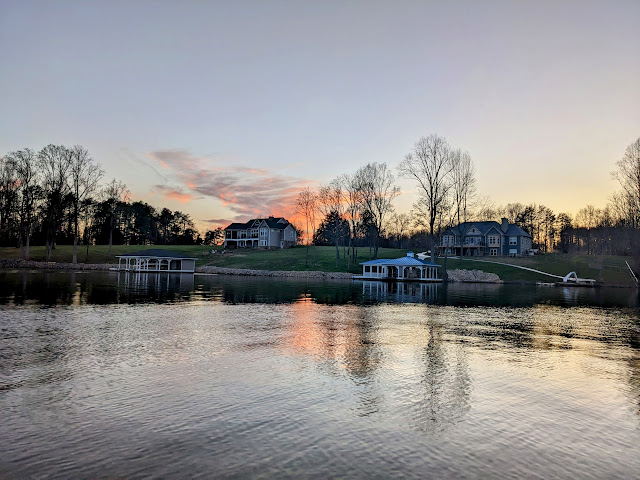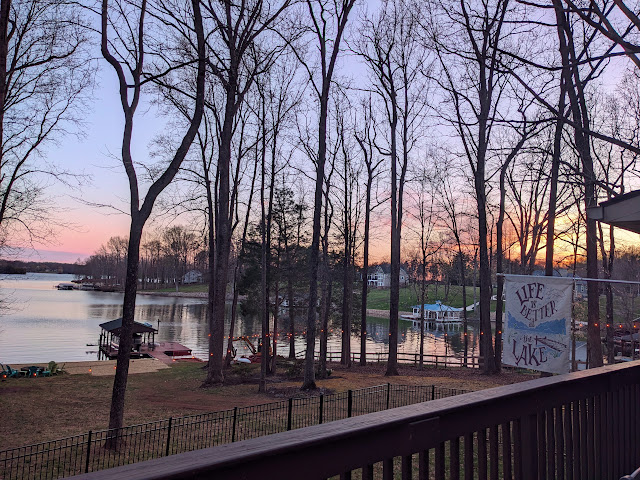
It's been so hard to find the time to blog lately, but I finally got a long weekend away and a few moments to breathe, enjoy nature, and catch up on things I enjoy. We booked an Airbnb in Lake Anna with friends, and despite almost cancelling the trip due to a stomach bug we recovered and ended up going after all. It was a lovely time, so I'll be interspersing this blog post on professional content with a few photos of our trip.
Doing even just a one-year tour at Main State (what we call State Department headquarters, also known as "HST" for the Harry S. Truman Building where Main State is housed) has taught me so much that I'm definitely going to take with me when I go back out to the field later this year. Some of the things I learned are tidbits I had vaguely heard before but didn't think about too much until I witnessed it firsthand. One is that work-life balance for most is generally better in overseas tours than domestic tours, especially domestic tours in regional bureaus. I'm going to think about that when I'm at post and corresponding with the desk - they probably have a lot on their plate that I don't have visibility on every day. Plus, when they message me after hours or ask for something in a ridiculous time frame, they're probably just the messengers and it's not their fault.

Whenever I worked on official U.S. government visits abroad, I felt like post did all of the work and the desk was just kind of there if we needed them. Now that I've seen visits from the other side, I know that's not the case. The desk does a lot of work helping prepare the paper and the logistics and serving as a liaison between those working the visit on the ground and the staffers and special assistants and others supporting whoever it is who's visiting. Even when a non-State Department official visits, the State Department does a lot of work to make sure the visitor is safe and the visit is effective and successful.
I wish people in the field knew how different DC work is from post work. It is not (as I previously thought) very similar work just happening in the United States instead of in a foreign country. There is a lot more paper and a lot less reporting, and the broadness of any given subject matter expertise is higher per position at least in a regional bureau. For example, a single desk officer in DC might cover all issues touching on another country including the bilateral relationship, their role in the region, their political and economic situation, consular issues, and more. At the same time, that post might have many officers that can each devote their attention to just one of those topics. I'm so impressed with the desk officers in my bureau, Near Eastern Affairs (NEA), for really knowing their stuff when they have to cover so much.

Bidding and networking are also a lot easier from DC, in my opinion. There are countless employee groups and professional development opportunities that span a huge range of interests and identities. While I've been in DC, I've been able to participate in a monthly breastfeeding support group, the Asian American Foreign Affairs Association, connections with colleagues who are also members of the Church of Jesus Christ of Latter-day Saints like me, and a DC mentoring program. I've also been able to find out about more bidding opportunities and connect with offices and hiring managers that I would have never had the same access to while serving overseas.

So many of my peers have said they'll never come to DC due to the cost of living, but I think it's doable for most depending on the job and where you're willing to live. If you have a job like mine where you get a special differential (in my case an 18% salary increase) and you're willing to live a ways outside of DC, it's a lot more affordable. Importantly, I think there are things you learn spending time actually working at Main State that you can't learn anywhere else, and I see higher level Foreign Service positions requiring DC experience more and more. Of course, compared to the housing provided overseas it will be a financial hit, but with enough planning most folks can prepare and budget for a few years of paying rent (like the rest of our country does all the time).
Others who have served in DC, please feel free to share your advice in the comments below: whether you agree with me that a DC tour is worthwhile, what surprised you, and what you wish people in the field knew. Thanks for reading!

The hard part is when you have mentally and financially prepared for it to be a 2 year tour in DC and then it becomes a 3 year tour instead because of language training. And not only that but the 18% differential will be taken away that last year. Ouch. Oh and did I mention we live in Arlington (because we could afford a house in Arlington while living overseas — tenants paid most of the mortgage then!) and we have three kids to support, all on one income (because let’s be honest, the money I make babysitting 16 hours a week does NOT qualify as an extra income). Send help! Ha
ReplyDeleteSo true! There were several language-designated jobs I did not bid on for this exact reason. I planned mentally and financially for a year in DC and then I was ready to get back out in the field. It's so much easier to do language training in between overseas tours.
DeleteAlways amazing how much of an FSO's job involved being a travel concierge and event planner. They really should emphasize this more when recruiting and even in A100.
ReplyDelete